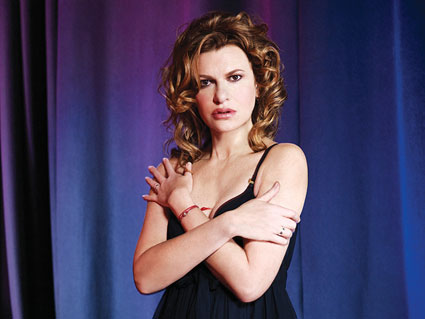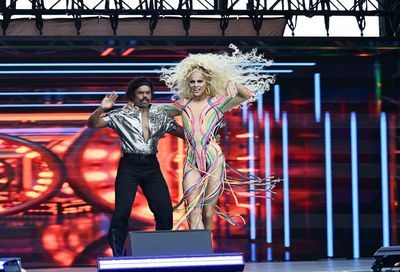Much Ado About Nothing
Twenty years after its debut, Sandra Bernhard brings 'Without You I'm Nothing' back to the stage

Sandra Bernhard
Twenty years ago when Sandra Bernhard debuted her one-woman show, Without You I’m Nothing, it was the start of a long-lived and highly quotable artistic journey. Funny, angry and edgy, Bernhard’s indelible performance solidified her place as one of the nation’s best live performers — not to mention a perennial favorite of the gay community.
From her film and television appearances, to her multiple books, to her second award-winning Broadway show, I’m Still Here…Damn It!, Bernhard has never strayed from the public eye.
Two decades later, Bernhard has brought her landmark show back to the stage, starting with a limited September run at D.C.’s Theater J at the D.C. Jewish Community Center.
A lot may have changed in the world over the past 20 years, but Bernhard’s sharp-edged commentary and acerbic style remain the same.
METRO WEEKLY: For those who have been big fans of Without You I’m Nothing, are there differences to expect when returning to the show 20 years later?
SANDRA BERNHARD: Yes, the opening is going to be totally different. It’s something I put together in the past year and there are a couple of new pieces, and some of the audience interplay is not in this show. We’ll play four or five key pieces from the show, interwoven with new stuff. It just evolves. To do the exact same thing would be hard for me 20 years later.
MW: It’s a very quotable show. Do you ever get tired of people coming up to you and saying, ”There must have been dust on those mints?”
BERNHARD: No, I never get tired of that. And that will be in this show.
MW: How are you different as a performer now than you were when you originally put together the show?
BERNHARD: I always feel like every year I perform it’s like peeling off another layer of the onion. I’m obviously much more seasoned, much more worldly and introspective. I have a 10-year-old daughter. I’m in a relationship I’ve been in for nine years. A lot of things have changed over the years politically and it’s just a different world we’re living in. But I think most importantly, as an artist I’ve evolved quite a bit.
MW: Do you ever look back at yourself as an early artist from your perspective now and think, ”I wish I had done that differently”?
BERNHARD: No, no, nothing. I’ve always been who I am at the time. Every decade that has unfolded has provided me with another platform and the ability to be stronger and secure about who I am as a person. But you can only become that by going through and being very much in the moment, being who you are and what the world is at that time. It’s always fun and exciting to look back and see where you’ve come from.
MW: You said that audience interaction won’t be part of the show.
BERNHARD: I used to do a thing with a flashlight on the audience. That’s just something I wouldn’t necessarily do now. It just doesn’t interest me. When I do different shows that are more improvisational, I will talk to the audience but in a different kind of way. I have a different kind of take on people and myself.
MW: I saw you a couple of years ago in Provincetown, and you had this really bizarre heckler.
BERNHARD: Oh, that guy who got all freaked out about the politics and I told him to fuck off and get out.
MW: And he got out.
BERNHARD: He was an animal — so counter-productive to everything I was talking about. Like, I’m totally on ”his side” and he’s arguing with me. It was bizarre. I think he was very drunk.
MW: Do you get a lot of that, people wanting to argue with you, particularly when you’re getting into political things?
BERNHARD: Yes and no. For a show like this in a theatrical setting I don’t think there will be as much, but you never know. It’s a highly charged time and anything is possible, but I don’t expect that to be a big issue. I was [in Provincetown at] a smaller venue and it was much more conversational because I was practically on top of the audience. One guy was saying ”I love you, I love you” and he got up and he hugged me. It can be fun, but when they start getting crazy you gotta shut it down.

MW: When you’re on stage and performing live, whether it be this revival or other shows, what is it that you get out of it? What is it that keeps you coming back to it?
BERNHARD: I think it’s something that I’m driven to do. Performing live to me is the most exciting thing I get to do in my life as an artist. And the fact that I have the ability and the talent to do it is something I feel like I can never turn my back on because not that many people do have it. It’s easy to stand in front of a camera and be an actor — you have like a million opportunities to shoot it from a different angle. But as a live performer you have one shot every night and that to me is such an amazing thing. And you’re also connecting with an audience in a live situation. It’s a one-time experience for everybody. I love doing it.
MW: How do you handle like a bad night?
BERNHARD: Well, it’s very rare that I have a bad night. Yes, some shows are not as dynamic as others, but even if I’m off my mark, I know how to deliver the goods because that’s just what I do.
MW: Some people think you come across as angry or even a little bit mean.
BERNHARD: I think that the only time I appear angry and mean is when I feel very passionate about something. Also, I’ve changed so much over the years that I wouldn’t categorize my work as angry anymore. When I started off I was probably more intimidated and scared being a woman in the venue I was in so I had my defenses more finely tuned. And I don’t need those defenses anymore.
If there’s someone in an audience that’s stupid or there’s a situation that calls for an honest appraisal of where we’re at culturally, and people don’t like hearing that, it can be perceived as angry. Good, because those are the people who need to get awakened from their slumbers of stupidity.
MW: In the interview you did with Metro Weekly in 2002, you talked about your artistic persona being based on a contempt for mediocrity. Is that still the case?
BERNHARD: No, probably not. You know, I don’t like mediocrity and I don’t really like what’s going on culturally, but as long as I keep getting to do what I want to do and have my own little niche, I don’t think I care so much about it.
MW: The amount of art and culture continues to grow because media options continue to grow, and more and more people have access to both producing and consuming. Have you ever expected the level of artistic matter to go up or do you expect it to go down?
BERNHARD: I think there are too many outlets. I think there are too many people trying to do too much and a lot of people are motivated for the wrong reasons to be in the business or try to express themselves. On the other hand, because of the immediacy of the Internet, if somebody is clever and they’ve got something to say, it’s also a fun outlet. If you want to be a great performer, you’ve got to go out and roll up your sleeves and do it in front of a live audience and that’s all there is to it.
MW: Again going back to the 2002 interview, you were an early and pretty harsh critic of George W. Bush. Given the fall in his popularity in the country, do you feel somewhat vindicated?
BERNHARD: I don’t care about being vindicated. All I care about is what’s happened to this country and how it’s affected the global stage. It’s very disturbing to me that people are not more engaged and involved, more vocal and passionate about it. I don’t really care about myself. I truly care about what’s happening to the human race and the earth and the consciousness of humanity, and that to me is all that matters, really and truly. As an artist and somebody who gets to have a platform and be able to express themselves, yeah, I’m glad that people finally caught up. But things are still in a terrible condition and we haven’t gotten through this election yet. We hope and pray that it comes out on the right side of history.
MW: Why do you think people are so resistant to getting involved or being more cognizant of the overall picture?
BERNHARD: I think there’s a million reasons. The average, working-class person doesn’t even have the energy to really deal with it, even though it affects them the most. And I think that a lot of other people are just lazy. There are so many variables as to why we can’t unify as a country right now. I think the media has so much to do with it because I don’t necessarily trust these polls that are supposedly reflecting where people are at. I don’t know if the media has the peoples’ best interest at heart. They want to sell stories and they want people to be riled up — it’s what they do to make money. I just think that we don’t really know definitively how people feel right now. I’m hoping it will be reflected in the elections in November.
MW: Given what John McCain’s campaign has put out about ”celebrity” and things like that, they seem to be trying to tap into the idea that people who are famous are vapid and don’t have things to contribute.
BERNHARD: They don’t like the idea that most performers and artists are usually liberal and want things to be good for people. They want people to be angry and uptight and bitter and pissed off. They feel that entertainers are entitled — and to a certain extent we are, but certainly no more so than John McCain or anybody who has the kind of money that Cindy McCain has. Everything that’s been played out over the past years has been in the name of money and holding down the middle classes and the working classes. It’s totally hypocritical and stupid for them to point fingers at celebrities.
MW: Do you feel optimistic about Barack Obama’s chances in the campaign?
BERNHARD: I do feel optimistic. Has he said everything the way I wanted him to say it? No. Do I think he’s a politician? Yes. But I certainly have more faith in him and I really like Joe Biden quite a bit. I’m glad that it’s somebody who’s fresh and new. And like all presidents who are smart, they surround themselves with smart people. No president makes any decision on his own — certainly George Bush probably made next to none. I don’t know why people are scared that [Obama is] so inexperienced. George Bush has had it for eight years and he seems like he doesn’t notice or had any reaction to what he’s created in the world, so what does that say?
MW: On a different topic, you mentioned your daughter is 10 now.
BERNHARD: She’s a great kid. I educate her in a much different way. She goes to a school that’s kind of media-free. She watches very select TV that I feel is fun and good for her. We don’t have Us magazine in the house. She understands what’s essential in the world.
MW: Has being a mother become more challenging over time or less as she gets older?
BERNHARD: Every year has its own particular challenges, but she’s so open and so a part of my life and my girlfriend’s that it never scares me or frustrates me, because she really loves us. We’re such a part of her life that I feel that we can really communicate and get through to each other.
MW: You mentioned that you keep the house with no Us magazines around and you’re very conscious about the type of media that’s coming into your house. Is that a conservative approach? Is there a cultural criticism implicit in that?
BERNHARD: Yes, there’s a cultural criticism that none of these things are good for anybody, let alone a child.
MW: Is it the sex and violence? Is it something different?
BERNHARD: It’s crap. She doesn’t draw anything beautiful from it, you know, there’s nothing that’s moving or important. She likes to read the cartoons in the New Yorker. I’m not trying to paint her as some intellectual kid. She does relate to things that are a little more intelligent because that’s what she’s exposed to. And I just think that any kid in this world who is exposed to love, compassion, beauty and art will become a reflection of that, just as any kid who is exposed to stupidity and mediocrity and violence will be a reflection of that.
MW: Skipping back to the show, what part of it speaks to you the most 20 years later?
BERNHARD: I don’t know if anything speaks to me. With me, it’s more of like looking through a picture book of where I was at and where we were at culturally that I relate to. But all of it — it doesn’t feel like that long ago, either.
MW: Twenty years ago, we were coming off the Reagan administration. Right now we’re about to come off the Bush administration. Do you feel that there are similarities between the time that you originally conceived the show and now?
BERNHARD: No, I don’t feel like that. I feel like Reagan planted the seeds for what happened but I don’t think anybody could have predicted how bad it’s become.
MW: I asked you if you were optimistic about the election. Are you optimistic about where the world is going or where it can end up?
BERNHARD: I don’t think it’s a matter of optimistic. I don’t mean to sound isolationist, but I feel like for my daughter and my own happiness, I have to create my own little world with people I love to be with. I can’t say that I feel particularly optimistic. I feel like people are lazier than ever and all the real goodness has been sucked out of our culture in many ways. It doesn’t really bother me because I know where to go to find it because I’m lucky I can. I feel bad for a lot of other people who can’t, who don’t have access to it. But that’s why I try to do what I do to bring some of what I think is beautiful to my audiences and to people I meet along the way.
Without You I’m Nothing runs Sept. 9 to 28 at Theater J, at the DCJCC, 1529 16th St. NW. Tickets are $45-$60. Visit boxofficetickets.com or call 1-800-494-TIXS.
On Thursday, Sept. 25, the DCJCC’s Gay & Lesbian Outreach and Engagement program (GLOE) offers specially discounted tickets ($40) that include a post-show reception with Bernhard. For tickets to this event, call 202-777-3252 or visit www.washingtondcjcc.org/gloe.
Support Metro Weekly’s Journalism
These are challenging times for news organizations. And yet it’s crucial we stay active and provide vital resources and information to both our local readers and the world. So won’t you please take a moment and consider supporting Metro Weekly with a membership? For as little as $5 a month, you can help ensure Metro Weekly magazine and MetroWeekly.com remain free, viable resources as we provide the best, most diverse, culturally-resonant LGBTQ coverage in both the D.C. region and around the world. Memberships come with exclusive perks and discounts, your own personal digital delivery of each week’s magazine (and an archive), access to our Member's Lounge when it launches this fall, and exclusive members-only items like Metro Weekly Membership Mugs and Tote Bags! Check out all our membership levels here and please join us today!


























